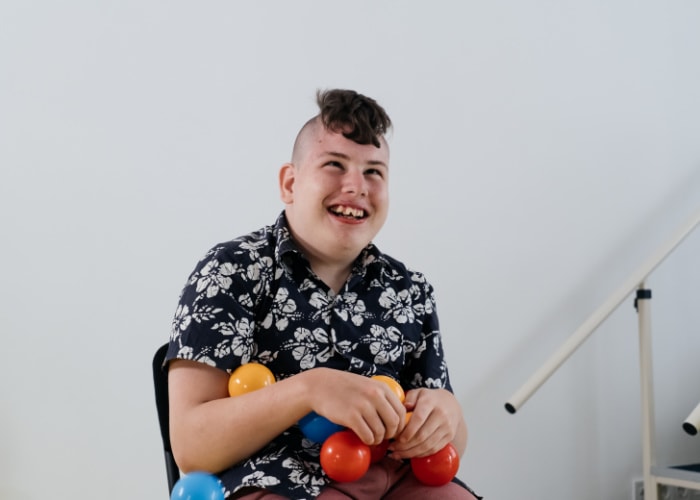Are you tired of feeling sluggish and wondering if toxins might be affecting your health?…

Can Autism Go Away With Age? What Science Tells Us in 2025
As a parent of a child recently diagnosed with autism spectrum disorder, you might wonder if these challenges will last forever. Can autism go away with age? This is a question many parents ask, hoping their child might ‘outgrow’ their diagnosis. Let’s look at what current research tells us about autism over time.
Key Takeaways
- Autism Diagnosis and Development: Learn about the nature of autism spectrum disorder, how it’s diagnosed, and how symptoms may change over time.
- Changes in Autism Symptoms: Find out how autism symptoms might evolve with age and development, and why some children show significant improvement.
- Support and Intervention: Discover how early intervention can help children with autism develop essential skills and potentially reduce symptom severity.

What Is Autism Spectrum Disorder?
Autism spectrum disorder is a neurodevelopmental condition that affects how people perceive and interact with the world around them. It’s characterised by differences in social interaction, communication patterns, and sometimes repetitive behaviours or specific interests.
Brain development in people with autism is different, not wrong. These differences affect how brain cells communicate and process information, leading to the unique traits we associate with autism.
The term “spectrum” is important – it means that autism affects people in widely different ways. Some individuals might have mild autism with minimal support needs, while others might experience more severe symptoms requiring substantial support.
According to the NHS, autism is a lifelong developmental disability that affects how people communicate and interact with the world.
Common Signs of Autism
Recognising autism signs early can lead to early diagnosis and support. Some common signs to be aware of include differences in social communication and interaction. Children with autism might have trouble with social interactions and struggle to understand other people’s facial expressions. They may also show trouble communicating or experience delays in language development.
Many children on the autism spectrum display repetitive behaviours or movements and show a strong preference for routine and predictability. They might develop intense focus on specific interests and exhibit sensory sensitivities to sounds, lights, or textures.
These autistic symptoms typically appear during early childhood, often before age 3. However, some children might not receive an autism diagnosis until later, especially those with more subtle presentations or less severe symptoms.
The National Autistic Society offers extensive information about the signs of autism and how they might present at different ages.

Can Autism Go Away With Age?
The short answer is that autism spectrum disorder is generally considered a lifelong condition. It’s not something that can be “cured” or that simply disappears. However, this doesn’t mean that autism symptoms stay the same throughout life.
Many children with autism experience significant changes in their symptom presentation as they grow. Some may show remarkable improvement, to the point where they might no longer meet the full criteria for an autism diagnosis later in life.
Research from Great Ormond Street Hospital confirms that autism is a lifelong condition, but the way it affects a person may change over time.
Changes in Symptoms Over Time
Research shows that autism symptoms often change with age and development:
| Age Range | Potential Changes |
|---|---|
| Early Childhood (2-5) | Most noticeable symptoms; critical period for early intervention |
| School Age (6-12) | Development of social skills and communication skills through therapies and education |
| Adolescence (13-18) | Potential for improvement in social understanding; may develop coping strategies |
| Adulthood | Continued development and adaptation; many lead independent lives |
Would you also like a version that’s styled a little differently, like with bullet points inside the cells?
A 2023 study published in the Journal of Child Psychology and Psychiatry found that approximately 20% of children correctly diagnosed with autism showed such significant improvement by adolescence that they no longer met the diagnostic criteria according to the Diagnostic and Statistical Manual.
Does this mean their autism “went away”? Not exactly. Most experts believe that the underlying neurological differences remain, but the person has developed skills and strategies that help them navigate social situations more effectively.

Factors That Influence Symptom Changes
Several factors may contribute to how autism symptoms change over time:
Early Intervention
Early intervention plays a crucial role in supporting development. Children who receive appropriate therapies and supports from a young age often show greater improvements in language skills, social skills, behavioural regulation, and cognitive abilities.
Therapies such as speech therapy, behavioural therapy, and occupational therapy can help children develop important skills that may reduce the impact of autism symptoms over time.
The Autism Education Trust highlights the importance of early support and appropriate educational approaches for children with autism.
Cognitive Abilities
Children with stronger cognitive abilities often show more improvement in autism symptoms over time. Higher intelligence and language abilities at an early age are associated with better outcomes.
Severity of Initial Symptoms
The initial severity of autism symptoms can influence long-term outcomes. Children with less severe symptoms or high functioning autism may be more likely to show significant improvement over time.
Support Systems
Strong family support, appropriate educational settings, and access to ongoing therapies all contribute to better outcomes for autistic people.
What Does the Research Say?
The National Institute of Mental Health and other research organizations have conducted numerous studies on the long-term outcomes for people with autism.
A landmark study from the American Psychiatric Association followed 85 children diagnosed with autism from early childhood into adulthood. The findings showed that while most continued to meet the criteria for autism spectrum disorder, their symptoms often changed significantly:
About 15% achieved a “very good” outcome with minimal symptoms affecting daily life. Roughly 25% showed good improvement but still had noticeable symptoms. The remaining 60% continued to require varying levels of support.
The study also found that verbal IQ at age 5 was one of the strongest predictors of adult outcomes.
Research published by University College London suggests that autistic adults may face unique challenges as they age, highlighting the importance of lifelong support.

Why Some Children Show Dramatic Improvement
Sometimes, children who were once clearly on the autism spectrum show such dramatic improvement that they appear to no longer have autism. There are several possible explanations for this:
Optimal Intervention Match
Some children respond exceptionally well to specific interventions that match their unique learning style and needs. When early treatment aligns perfectly with a child’s specific challenges, remarkable progress can occur.
Brain Plasticity
The young brain is incredibly adaptable. During early development, the brain can form new connections and pathways. This neuroplasticity may allow some children with autism to develop alternative neural pathways that support better social and communication skills.
Research from King’s College London has identified specific brain plasticity mechanisms that differ in children with autism, providing insights into potential treatment approaches.
Initial Misdiagnosis
In some cases, what appears to be autism disappears because the original diagnosis may not have been accurate. Other conditions can sometimes present with similar symptoms to autism, including language disorders, anxiety, or attention difficulties.
Compensatory Strategies
Many autistic people, especially those with mild autism, develop effective strategies to navigate social situations even though they may still process social information differently. These compensatory strategies can mask symptoms.

Overall
While autism spectrum disorder is considered a lifelong diagnosis, the way it affects an individual can change dramatically over time. With appropriate support, many children diagnosed with autism develop skills and strategies that allow them to lead normal lives, even if the underlying neurological differences remain.
The focus should be on providing the right supports at the right time to help each autistic child reach their full potential. Rather than asking if autism can be outgrown or cured, a more helpful question might be: “How can we best support this person’s development and well-being throughout their life?”
Remember that each person with autism is unique, and their developmental trajectory will be individual to them. With understanding, acceptance, and appropriate support, people across the autism spectrum can thrive and make valuable contributions to society.
Frequently Asked Questions
What causes autism spectrum disorder?
Autism results from a combination of genetic and environmental factors that affect brain development. While the exact causes are still being researched, scientists believe that both genetic predisposition and certain environmental influences play roles in the development of autism. There is strong evidence that autism affects brain structure and function, particularly in areas related to social communication.
At what age can autism be diagnosed?
Autism symptoms can often be detected by 18 months, and reliable early diagnosis is possible by age 2. However, many children are not diagnosed until later. The American Psychiatric Association notes that early symptoms may include reduced eye contact, lack of response to name, and delayed language skills. Early screening is recommended for all children at 18 and 24 months as part of routine child health check-ups.
Can children with mild autism symptoms lead typical lives?
Many individuals with mild autism or what was previously called Asperger’s syndrome lead fulfilling, independent lives. With appropriate support and intervention, people with less severe symptoms often develop good communication skills and can excel in areas of interest. The outcomes depend on many factors, including cognitive abilities, access to appropriate education, and social support systems.
Does autism get worse with age?
Autism itself doesn’t typically worsen with age, but challenges may change. Some autism symptoms may become more or less prominent during different developmental stages. For example, social demands increase with age, which might make social differences more noticeable during adolescence. However, with continued support and development of coping strategies, many individuals show improvement in managing challenges over time.
How does early intervention help children with autism?
Early intervention plays a crucial role in supporting development. Research shows that intensive, appropriate intervention starting before age 3-5 has significant benefits. These programs focus on developing language skills, social skills, behavioural regulation, and cognitive abilities. Early therapy can take advantage of the young brain’s plasticity, potentially reducing the impact of autism symptoms over time.
Can diet changes help reduce autism symptoms?
While some families report improvements with dietary changes, there is limited scientific evidence supporting specific diets for autism. Some children with autism have gastrointestinal issues that may benefit from dietary management, but these are addressed on an individual basis. Always consult healthcare providers before making significant dietary changes for a child with autism.
How do I know if my child needs an autism evaluation?
Consider an autism evaluation if your child shows delays in language development, limited eye contact, difficulty with social interactions, repetitive behaviours, or intense fixations on specific objects or topics. Trust your instincts. If you’re concerned about your child’s development, discuss it with your paediatrician. Early identification leads to earlier support, which is associated with better outcomes.
What therapy options are available for autism?
Many evidence-based approaches help individuals with autism develop skills and manage challenges. These include Applied Behaviour Analysis (ABA), speech therapy, occupational therapy, social skills training, and cognitive-behavioural therapy. The best approach depends on the individual’s specific needs, strengths, and challenges, and often a combination of therapies is most effective.
Can adults be diagnosed with autism?
Yes, many people receive an autism diagnosis in adulthood. Some individuals with less severe symptoms may have developed coping strategies that masked their challenges earlier in life. As awareness increases, more adults are recognizing traits of autism in themselves. Adult diagnosis can provide insight, access to appropriate supports, and a better understanding of lifelong challenges.
How does autism affect the family?
Having a family member with autism can present both challenges and opportunities for growth. Families may need to adapt routines, learn specific support strategies, and navigate service systems. Support groups, family therapy, and respite care can help families thrive. Many families report that understanding autism has enriched their lives and perspective, even while acknowledging the challenges.



This Post Has 0 Comments